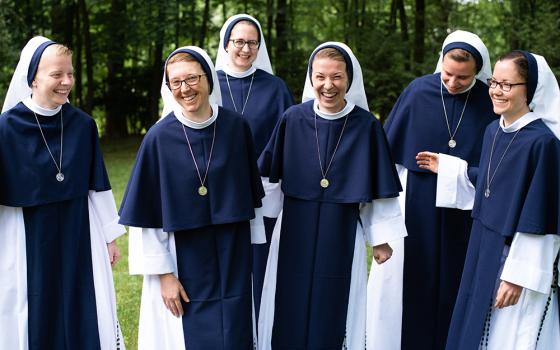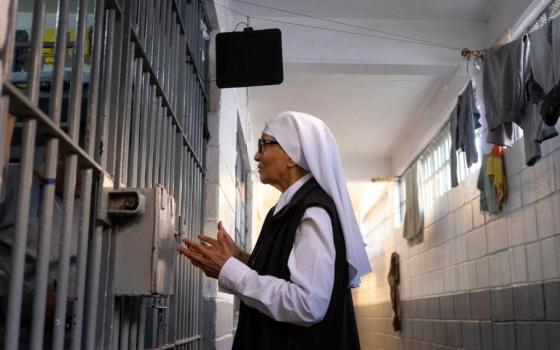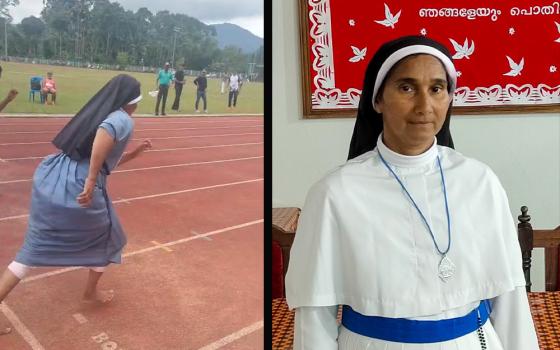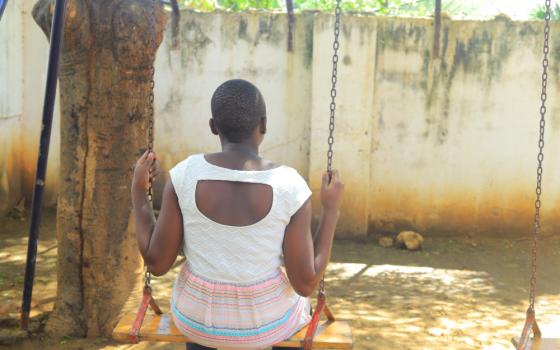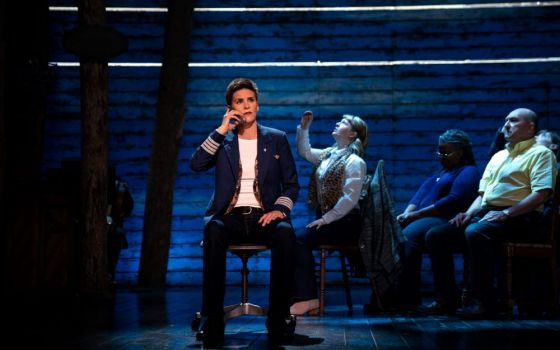A person in New York City stands in the rain with a red rose at the 9/11 Memorial ahead of the 20th anniversary of the September 11 attacks in Manhattan. (CNS/Reuters/Andrew Kelly)
Editor's note: This is a special Monday edition of Horizons. Global Sisters Report published a column honoring the 20th anniversary of the 9/11 attacks on New York City in place of Horizons on Sept. 10. The regular Horizons schedule will resume this Friday, Sept. 17.
A couple weeks ago, a video of a plane taking off from Afghanistan while people hung from it — desperate to get out of the country as the U.S. military withdrew and the Taliban took control — went viral.
Last week, an Afghan journalist, a recent refugee already in the U.S., tweeted a picture of the insufficient food they were receiving at one of the military bases. The backlash was swift; many Americans thought the man should be grateful for whatever he is getting, while others raged that he dared to complain while so many veterans of a 20-year war are struggling with homelessness, mental and physical health challenges, and more.
I have often wondered while sitting in different airports and watched military personnel — many of them achingly young — called up for priority boarding and sometimes upgraded to first class, whether those gestures meant much when military personnel found themselves in the eye of the storm, worried about an explosive device maiming or killing them; when they discovered their "counteroffensives" had resulted in the loss of many innocent civilians, including children; when they formed bonds with the local people then had to leave them behind to an uncertain fate; when they abetted the torture of suspected terrorist masterminds who were latter discovered to be completely innocent.
What is the collective toll on individuals — Afghan, Syrian and American — of the 20-year war on terrorism? Is the world safer for anyone? Was it fair to wage destruction and mayhem on an entire country for the perceived actions of a few? And what does it mean now that the Taliban has taken over, and the U.S. must negotiate with them, so evacuations can continue?
Advertisement
This week, I watched a news story about a small midwestern American town preparing to welcome Afghan refugees. Quite a few of the people interviewed were apprehensive about whether they would be safe with refugees as neighbors. This town has probably lost some of its own younger folk, who signed up for war not necessarily out of patriotism, but because in many low-income communities, the military is one of the only ways out of poverty.
I think of all those extremely young and earnest military personnel that I have seen at airports, who have gotten many "thank you for your service" comments. I wonder what they have truly been in service of as we look back at all those years? Are we safer now — not just as a country but as the world — from terrorist attacks? For Afghans and Syrians, is there any silver lining in what they have endured?
I also fear that Afghan refugees will face Islamophobia, racism and prejudice in their new communities. I fear that women's choices to wear the hijab will be frowned upon and misunderstood because the hijab has been conflated with the oppression of women. I fear that their demands for basic human rights like food, shelter, and clothing will be trampled upon just like the backlash I witnessed when that Afghani journalist tweeted a pic of the meager portions of food he had received.
In 2015, when I was in Nairobi interning at the U.N. refugee agency's regional hub, I got word on a Thursday morning of yet another terrorist attack on Kenyan soil. It was Holy Week, and casualties were being airlifted to a morgue in Nairobi. On Holy Saturday, as I watched the news via social media, my entire being questioned my call — amid the urgent needs of families learning they'd lost loved ones — while I was preparing for Easter celebrations.
Monday, wracked by the guilt of having spent the past two days in Easter festivities while suffering was literally on our doorstep, I asked a friend to accompany me to the Chiromo mortuary, if only for a few minutes, to donate some food for the many affected families awaiting autopsy results that would help identify their kin.
The long grief of families and friends who lost someone in the 9/11 attacks is acute.
The smell hit me even before we pulled into the compound; the wails and screams of grief as people's worst fears were confirmed periodically rent the air. While I was there a few days later volunteering to walk with families through the morgue, leaders of the Muslim community came to offer their condolences, and the sight of them set off quite a few of the grieving families. In their minds, all Muslims were responsible for the death of their loved ones.
This same conflation of Islam with terrorism plays out in different parts of the world, including the U.S. The fact is, though, that the majority of those throughout the world who have paid the price for 9/11 and all other terrorist attacks are innocent and abhor fundamentalist, violent groups and how they distortion the faith.
This past Sunday I was first lector at my local parish, which meant that I also led the prayers of the faithful. One petition commemorated the 20th anniversary of 9/11, praying for all those who had lost loved ones in that terrible attack. The long grief of families and friends who lost someone in the 9/11 attacks is acute, and I have read several heartbreaking accounts of that day.
However, we must also pray for all those who have suffered greatly in the violent aftermath of that fateful day. And we must critically re-examine the notion of war because the majority of casualties tend to be the innocent and defenseless.

